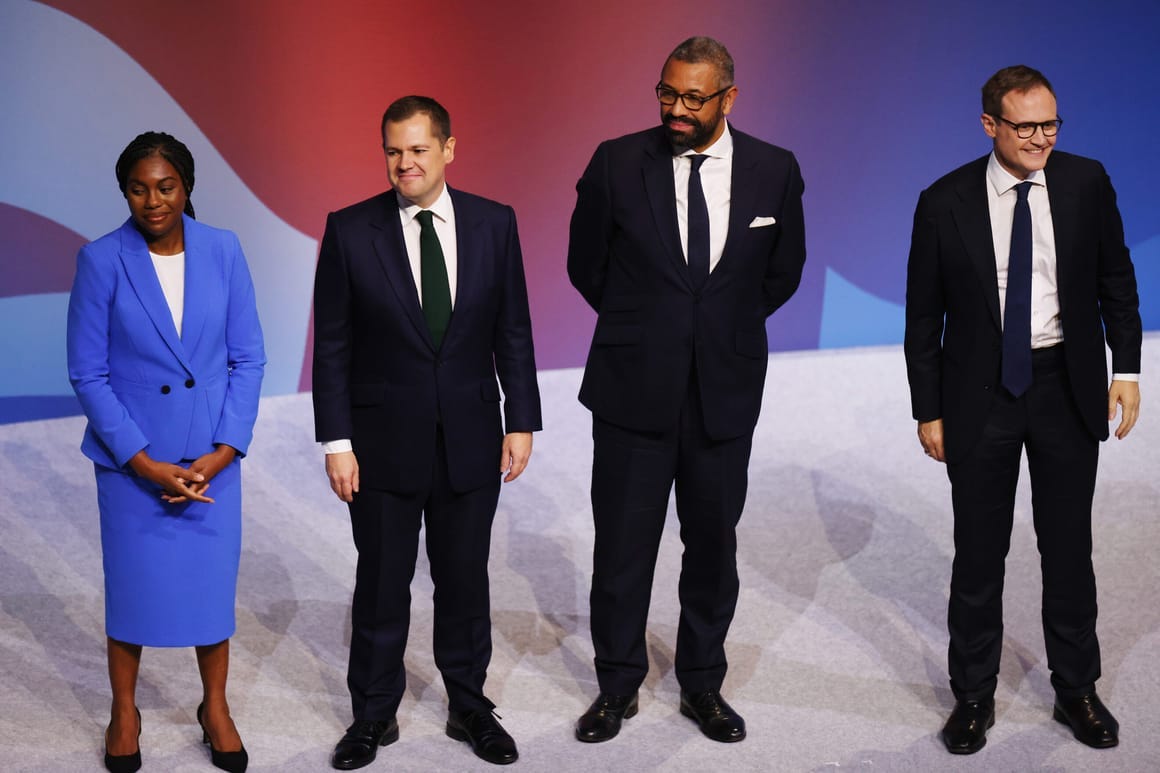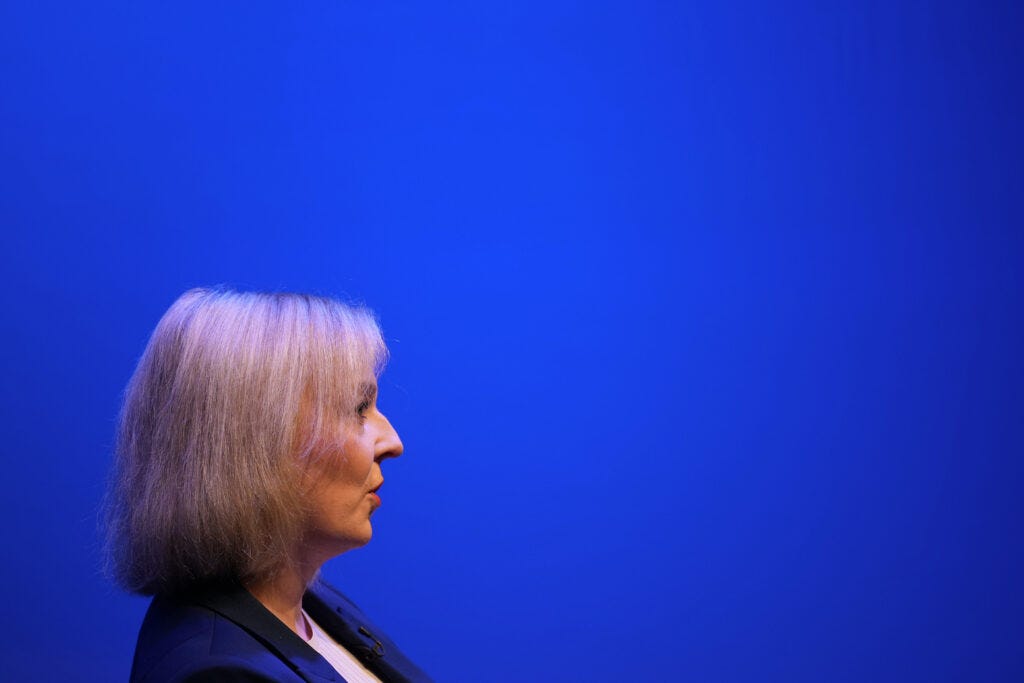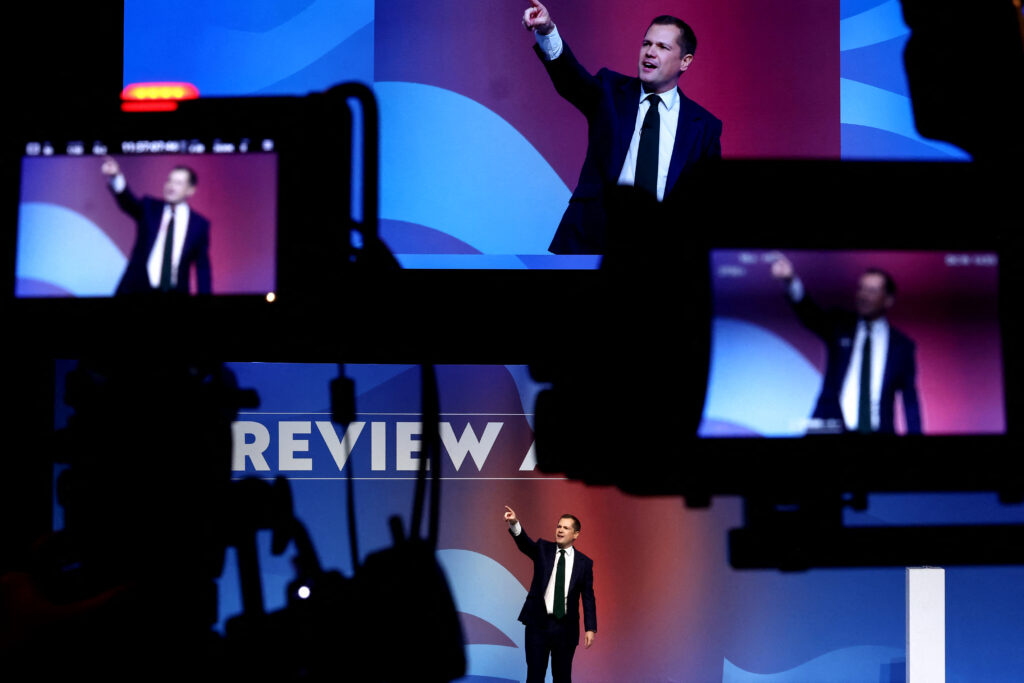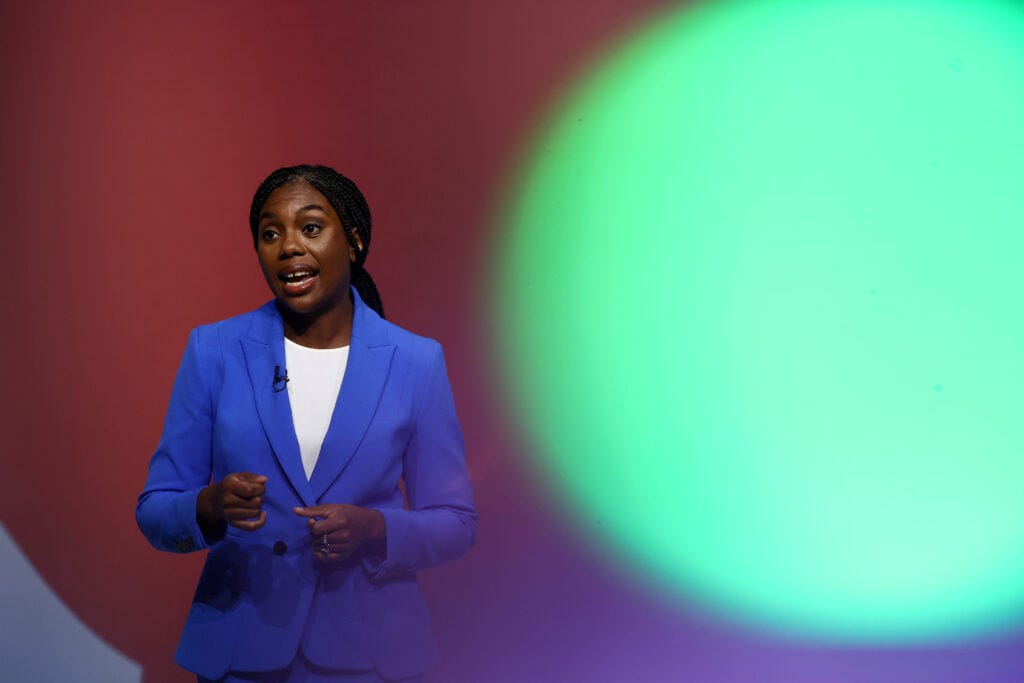UK Politics: The pointless battle for the Tory crown
The ghost of Margaret Thatcher continued to haunt the Conservatives as an irrelevant beauty pageant played out in Birmingham.

By Tanya Gold
Tanya Gold is a freelance journalist.
BIRMINGHAM, U.K. — At least it wasn’t boring.
The Conservative Party, fresh from its worst defeat in a century, gathered in Birmingham to choose its sixth leader in eight years: blind men fighting for spectacles.
The question is: do they chase their left wing, which fled to the Europhile Liberal Democrats, or their right, who want to close the borders and dance with Nigel Farage?
The conference center is disorientating, perhaps deliberately. It’s all escalators and stairways which seem, in some awful metaphor, to lead you back to where you began, like an Escher painting.
This leadership election gives conference the appearance of energy: people say the atmosphere is “upbeat,” but that’s Toryism for you. If you want weepers try Labour. Never forget, Britain enjoyed the Blitz.
It’s a feint, a hangover from government; the exhibition area is full because delegates assumed the Tories would be in office until Christmas. There are four candidates, who the parliamentary party — now just 121 strong — will reduce to two next week.
The Tory membership then chooses the winner, who is, by custom, is usually the candidate least likely to win a general election. The Conservative membership is largely white, affluent, and aging, their politics are a protest to a world they no longer understand or recognize. They fall asleep in events, and people wonder if they are dead.
There’s earnest Tom Tugendhat, who talks about being a soldier (a variation on Keir Starmer’s “my father was a toolmaker”) and holds a series of “Tom-versations”. (Part of the Tory problem is they have forgotten how to speak. All politicians have. They say things like: Global Britain). There is handsome James Cleverly, a “Bridgerton” hero, all shoulders and hail-fellow-well-met. (One Cleverly supporter told a journalist she backed him because he’s the only candidate who wouldn’t get attacked in a pub.)
Then there is the right: luminous Kemi Badenoch, who loves a mirror and a fight — increasingly a fight with a mirror. People say Badenoch is too odd to be prime minister, but they said that about Margaret Thatcher. As conference begins, the front-runner is Robert Jenrick, who looks like a minor Dickensian villain.
Candidates are surrounded by acolytes pretending to be the Secret Service — everyone young in British politics has watched “The West Wing.” Jendrick-ites — is that the word? — try to close the bridge from the conference center to the Hyatt Hotel so their candidate can stroll unmolested, but are ignored. This is a TV and X event, and it goes like this: someone says something controversial — Jenrick, for instance, declares British special forces kill people abroad, arresting people is too much paperwork — and the press rush to Tugendhat to hear him tut. A Tugendtut, if you like.
There are political-themed consumer goods: a wallet that says “Lower Taxes” (Cleverly for leader); a baseball cap that says I’m a “Tugend-Hat.” A green apple with a Badenoch sticker.
On Monday the party travels to its wilder shores: to Liz Truss, prime minister for 49 days in 2022. The membership loves Truss, who is a case study in bloody and unbowed: increasingly she looks like a woman who survived a hostage situation and now works for Fox News.

Delegates queue for an hour to see her; a hundred are turned away. Two years after she fell, Truss’ unease has metamorphosed into a carapace. She speaks for Donald Trump, the inciter of the Capitol riots — his winning would cheer her up, she says — and berates journalists.
If the Tory Party is not yet ready to take responsibility for its failures, Truss is its purest avatar. I don’t think she knows it has failed. She says she would have performed better than Rishi Sunak in the general election when, rather, he lost the general election so badly due to her.
Wiser heads wish she had not come. But the membership loves her, because they confuse intransigence with strength. There was no one to do makeup and hair in Downing Street, she complains. It is meaningless.
There is a séance for Margaret Thatcher; an event called, “What would Maggie do?” The panelists sit beside a life-size cardboard of Thatcher.
John Redwood, her chief policy adviser, acts as medium: “She’d be appalled by so many things,” he says. “She’d be appalled by the level of state debt, she’d be appalled by the extent of the deficit. She would understand this is monumental waste, incompetence, malevolence, even.
“You need focus,” he shouts, “you need clarity, you need management, you need vision! And the government today has none of these things! It doesn’t matter who the politicians are at the top. It is dire, it is dreadful, it is unacceptable!”
The right settles around a narrative: though the Tories ruled for 14 years, the Blairites never left power, and we live in the ash of woke Marxism.
I finally find a reasoned voice, Rachel Wolf, who co-authored the winning 2019 Conservative manifesto. “I think Thatcher would be serious,” she says quietly. At a hustings the day before, she says, the candidates gave one minute speeches. “This is totally ludicrous. What are we doing? We are still a serious country. Let’s allow our candidates to be serious in turn.”
Then she says: “We are simultaneously bemoaning the size of the state and berating Labour for their decision on the [now pared-back state benefit] winter fuel. Governing is hard. I don’t think she [Thatcher] would have a lot of time for that kind of surface speak.” But Wolf is an outlier. For most, it is about emotion. They can afford it.
New generation?
I tour the party shop, always a fair barometer of the Conservative soul. There is no Boris Johnson or David Cameron merch, though both won general elections: it is high-viz jackets (why?) and raincoats, and Churchill and Thatcher still. “I don’t think the next Tory prime minister is here,” a member tells me. Another says, “I don’t know where the new generation of Tory philosophers are.”
There is a Brexit event, asking: what happened to the benefits? Ah, yes. Speakers said they expected Brexit to be, “swifter, smoother, and softer.” We are, “in the worst possible situation.” “We walked out and sat on the doorstep and copied everything.” “We wasted those years.” “Brexit is like Bertha Mason in the attic [in Jane Eyre.] No one wants to talk about it.”
Another ghost is Boris Johnson, the hope that died. The candidates are too frightened to damn him for lying to parliament, destroying the 2019 victory, and mandate. Tugendhat is asked: would you let him back? He dodges it: it’s up to him, he says, and up to you.
Badenoch, the most relaxed orator — Tugendhat and Jenrick feel forced — makes the most mistakes, because she follows her own path. She is rude about foreign carers, she doubts maternity pay, but she emits, perhaps obliviously, a truth about modern politics, and herself.
“I don’t see anything in my Twitter feed now that doesn’t have my name in it,” she says at a social justice event of all places. “Because, clearly, I’ve been clicking on things that are mentioning me and Twitter has worked out that this person likes reading about Kemi Badenoch: and that is all that is coming to me.”
One member calls the leadership race “mad political bingo.” He thinks the candidates vie to say the wildest things: for attention; for X; for themselves.
The right candidates get more bullish. Badenoch says five to 10 percent of civil servants should be in prison; a prelude to her own stab-in-the-back myth? Jenrick says he named his daughter “Thatcher,” but misremembered the year Thatcher won the leadership. He was exposed as, potentially, a sham Thatcherite. This matters here, and only here.
On the final day the candidates speak to conference in front of a sign announcing “Review and Rebuild.” They each have an alarming promo video. The party chair introduces them, happy that members are “back at the heart” of our conference. And what damage will they do? An activist is given a bell in thanks for service: ask not for whom it tolls, etcetera.
Tugendhat begins and does worst. It’s the wrong kind of reasonableness, and, if he is frightening enough to be sanctioned by Russia, China and Iran, it doesn’t show. He can feel the hope, he says. We must do better, he says. It’s sane patriotism from a good soldier — a pale soldier — and that is not for the Tory members, who elected a woman (Truss) who said she wasn’t sure if France was really an ally. We are one nation, he says, to a conference that is happier when it feels under threat.
Cleverly’s promo video sounds wind-buffeted — is this metaphor? — but, when he says: “Let’s do this!” at the end of it, conference ignites. He should’ve winked. “What’s the purpose of our party?” he asked, and the room stills. Then he actually says, “Sorry.”
Maybe it’s a safe gambit from a man so boosterish, who looks like he could out-drink the fictional Boris Johnson the party loved. ( Johnson was not the man they thought he was). He ruins it by announcing: “The British people are never wrong” — they often are, but as a gaffe it less egregious than name searches on Twitter and biographical Thatcher slips.
He could have sat this out, he says, and preens: he could have spent more time with his Warhammer figurines. He praises Ronald Reagan and the NHS and Benjamin Disraeli. The jokes are good. He knows how to pause. He tells conference: “Let’s be more normal!” He won’t dream of yesterday: “Our best days are ahead.”
Blue lulls the crowd
After bonhomie, fear. Jenrick is all forced gestures and repressed intensity, a man inhabiting a self that is not his. He does not know how to pause, and he makes English sound like an alien tongue. In his promo video he interviews a man who looks like a wizard. He speaks to the bleak, and gauchely: borders must be maintained, foreign aid cut. Growing up in Wolverhampton gets a laugh; it shouldn’t have.
There is a bleached quality to his prose: “There was a woman as strong as the iron cast in my dad’s foundry: Margaret Thatcher!” “Starmer took the knee, but he will never take a stand.” He uses Yoda-isms, because that is how non-intellectuals summon gravity: “Together we will build.” When he says, “I loathe empty rhetoric” journalists laugh.

Finally, Badenoch, in Thatcher blue. Red suits her better, but blue lulls the crowd. “It is time to tell the truth,” she says. Her truth is Truss-esque: the system is broken, and not by Tories. “You can be in government, and not have power.” She attacks identity politics, university lecturers marking down Conservatives, and other Tory terrors. She says Toryism is not a clique. Isn’t it?
Now the question is — will the Conservatives embark on their own Corbynite experiment with Robert Jenrick, and throw themselves into the abyss? You can never rule that out. Cleverly could be a plausible one nation leader, ever in danger of doing the finger guns at voters, some of whom might do them back.
Badenoch glows with her own force— “I’m not afraid,” was her best line, because most of us are — but she is odd, and angry.
Now the MPs choose the final two: Jenrick is ahead with them. The second candidate should be Badenoch or Cleverly, but with such a miniscule electorate, the margins are tight. Then it goes to the members who will — as they accuse the left of doing — vote with their feelings on the day.
The best analysis I heard at conference was this: “I think it’s time to let Thatcher die.” For now, they can’t, and that is a measure of their failure. For as long as they cherish Thatcher — and only Thatcher — taking the ax to bloated enemies, they will do the same to themselves, and the future is already behind them.



